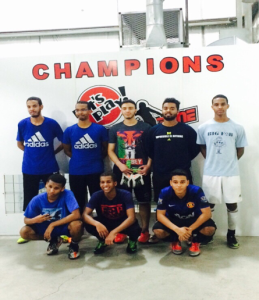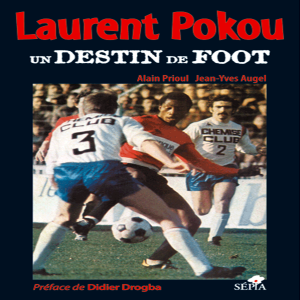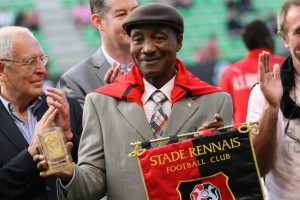This is a guest post by Yussif Abuharaz, an undergraduate student at Michigan State University.
I come from a thriving Muslim community in Flint, Michigan, made up of more than 100 families from many different cultural and ethnic backgrounds. My dad is originally from Omdurman, Sudan, and my mom is from Manchester, England, so both grew up in cities passionate for their football (soccer)!
Most kids in our community receive their education at The Flint Islamic Center and its community has served as my ‘home’ since I was born. Our community has a wealth of football talent and this was seen early on by Talal Khoulani. Talal, who was born in Germany and moved to America as a baby, is of Syrian descent. In 1999, Talal founded FOB soccer, which got its name from the tongue-in-cheek expression “Fresh off the Boat”. It started off as a small team that took part in the local six-a-side indoor league. It quickly grew into a recognizable and established football “mini” club that has fostered some phenomenal players. FOB is widely recognized in Flint’s Genesee County and has a reputation as a respectable organization in the Michigan soccer community.
As a Flint-born Sudanese-American, my life has revolved around football and for this I am very grateful to FOB. It has provided me with countless opportunities and experiences that I will always value. FOB has brought together our community of recent immigrants and established Michiganders. I have made good friendships and enjoyed playing with some amazing players and lots of people from different backgrounds.
Although little known outside our small Flint community, FOB has produced some fantastic players that have gone on to play NCAA soccer at Division 1 and 2 level and one of us just signed a professional contract in the MLS/USL. The centerpieces of FOB are a highly competitive men’s league and one of the biggest and most prestigious 3v3 holiday tournaments in the region: the FOB Turkey Shootout. Those of us in the community look forward to this event all year: it’s always one of the best times of the year. The teams are a mix of semi-pro, D1/D2 college athletes, and some very talented young players.
FOB is a fine example of the kind of grassroots soccer that exists in the U.S. but rarely gets media coverage. In an attempt to draw attention to the accomplishments of the program, here is a list of the Top Ten players to ever wear the FOB jersey.
 1. Issa Rayyan
1. Issa Rayyan
Rayyan is a Jordanian-American born in Dearborn, Michigan, and is probabably a clear-cut number 1 choice. He recently signed his first professional contract with Bethlehem Steel, Philadelphia Union’s USL team, after completing a year at Duke University and playing for Union’s academy team for several years. A lightning-quick player of exceptional technical ability and a very high soccer IQ, Rayyan has been involved with FOB Soccer from a very young age. He regularly participates in FOB Men’s league and the famous Thanksgiving Turkey Shootout tournament, putting in some of the most memorable performances to go along with a Men’s league championship and a Turkey shootout finals appearance.
2. Yamann Sahlool
An American-born Syrian, Sahlool grew up with FOB and has contributed significantly to its growth. Receiving high-level training and playing on two Michigan academy teams in his teenage years, Sahlool developed into a rising prodigy. A combination of terrific finishing skills, strong on-the-ball ability, and sensational off-the-ball awareness led to him scoring bunches of goals and having dominant performances etched in FOB history. Ruthless in front of goal, Sahlool won a Turkey shootout championship and went on to play at the University of Michigan for four years.
3. Khaled Zaki
Born in Egypt, Zaki is one of FOB’s most exciting players. He has showcased some of the best performances in both the Turkey Shootout and the men’s league. Grace on the ball and quick feet are at the root of his exceptional skills that make him one of the toughest players to contain. Zaki is a multiple-time leading goal scorer in the men’s league, multiple-time All-FOB first team, winner of the best offensive player award, and a Turkey Shootout champion. Yet another player who personifies what FOB is all about.
4. Belal Khoulani
Khoulani’s older brother started FOB and he is been part of the program since he started playing. A Syrian-American born in Arkansas and raised in Flint, he is an extremely well-balanced all-around player with an outstanding work rate and soccer IQ, Khoulani can play in a number of different positions: he makes great runs in defense, leads the attack, and truly shines in the midfield. Having the ability to affect the game in several ways is Khoulani’s unique trait. He controls the pace and tempo of the match while staying tactically disciplined in whatever position he’s in. Khoulani currently plays Division 1 soccer at the University of Wisconsin-Green Bay, after several years at the Vardar academy. He is a three-time men’s league Champion and assist leader, Turkey Shootout champion, and first team All-FOB.
 5. Ali Mukhtar
5. Ali Mukhtar
Mukhtar is regarded as one of the most exciting players to ever come through FOB. He is a Sudanese-American born in Flint, raised in Mississippi, who then moved back to Flint in middle school. A dazzling footballer who can use both feet equally well and has the ability to make any defender look silly. An extremely smooth and graceful player, he combines devastating pace and quickness with solid strength on the ball. Mukhtar is also a clinical finisher. He has played FOB since elementary school. Mukhtar is a three-time men’s league champion and leading scorer, Turkey Shootout champion, First Team All-FOB, and a four-time league MVP.
6. Kareem Shukairy
Shukairy is a Syrian-American raised in Flint. The Shukairy family is one of the biggest families in the local Muslim community which FOB anchors. A “Rolls Royce”-style player, Shukairy is smooth, poised, and elegant on the ball. A highly intelligent player who seems to always have his way on the field, he possesses high quality shooting and dribbling technique and is one of the smartest players on the field. Shukairy is a regular in Turkey Shootouts, men’s league, and college league. He is a Turkey Shootout champion and two-time First Team All-FOB.
7. Mohammad Mohammad
An Iraqi-American, Mohammad is an electric player with great pace. A versatile player who can play in the back line and on the wings, it is clear to see why he is so highly valued. Mohammad has been a part of FOB for many years and is regarded as one of the original FOB players. He is a men’s league champion and Second Team All-FOB.
8. Omer Saeed
A gifted and intelligent player, Saeed is seen as probably one of FOB’s most influential players. He is one of the many who were born and raised in Flint with a Sudanese background. He has the ability to completely dominate a game from the middle of the park and can be a match winner on any given day. Saeed is one of the smartest and most technically gifted midfielders, skipping past opponents with ease and picking out the perfect pass better than anyone. Saeed regularly tops the assist charts and continuously makes big plays. He is a two-time men’s league champion, All-FOB First team, four-time men’s league assist leader, and a men’s league MVP.
9. Yussif Abuharaz
According to Talal Khoulani, Abuharaz is the sort of the player that may go under the radar, but is a jack-of-all trades. He can put in solid shifts in defense, midfield, and attack. He placed in and around the top 5 in goals and assists almost every season. Abuharaz is exceptionally technical and a very good passer of the ball. His understanding of the game is up there with the best and he is willing to do all the dirty work in the midfield to help his team. His smooth, yet gritty style of play can be both easy on the eye and highly effective. Abuharaz has played for FOB since he was in middle school and is a two-time men’s league champion and a Turkey Shootout champion.
10. Sammy Saeed
Younger brother of Omer Saeed, Sammy is also a Sudanese-American from Flint. A speedy player of extraordinary fitness and athleticism, Saeed can be an effective and versatile player. At his best as a winger, he can also step in to play in the back line and make an impact on the game even as a forward. Saeed is regarded as a work horse who covers plenty of ground. He defends exceptionally well while being a box-to-box threat who can pop up with goals and assists. Saeed is also technically gifted and capable of breezing passed any defender who stands in his way. He is a two-time men’s league champion and two-time Turkey shootout runner up.
* * *
Soccer in the United States is growing rapidly. Despite its popularity, there are still major improvements needed. I believe more emphasis should be placed on individual player development and changing recruitment patterns. Small organizations and clubs can play a key role as they implement grassroots football values and styles that are critical for the game. FOB has done so for me and the Flint immigrant community that I have been lucky enough to call my own. Not only has FOB crafted me and many others into quality footballers that absolutely love the game, it has also served as a means of bringing people from many different cultures and ethnicities into one big family that, still to this day, take to the pitch as brothers above all else.
Category: Video
Beyond the Soccer Mom
The white, middle class, minivan-driving suburban “Soccer Mom” has been part of U.S. political discourse since at least the 1996 presidential election.
Two decades later, soccer is so embedded in mainstream American culture that a candidate is using past college playing experience to boost her campaign.
Democrat Amy McGrath is challenging GOP incumbent Andy Barr in Kentucky’s 6th congressional district. The New York Times calls this “one of the most fiercely fought races” in the upcoming 2018 midterm elections.
Running in a culturally conservative state that Trump won by 30 points in 2016, McGrath’s campaign emphasizes her military background: Naval Academy graduate, fighter pilot, 20 years in the Marine Corps. If that weren’t enough, she also has three little ones and is married to a Navy veteran (“a Republican”!).
The thirty-second “Goalkeeper” ad is the seventh released by the McGrath campaign. It opens with the candidate in full Navy goalkeeping gear strutting towards the camera, saying: “I’m Amy McGrath and I played soccer at the Naval Academy so I can handle cheap shots”—a reference to her opponent’s flurry of negative ads.
McGrath then takes her place between the goalposts and rolls the ball out. She parries shots away with a “technique should not be duplicated,” as an NCAA coach told me, while addressing tax cuts, border security, Nancy Pelosi (“she didn’t even want me to run!”), and the national debt. “Congressman [Barr], is that all you got?” McGrath asks, while her husband and kids clap from the sidelines.
Regardless of the outcome of Kentucky’s election, McGrath’s “Goalkeeper” ad suggests that the “Soccer Mom” idea in political discourse is finally giving way to the concept of a woman as “player,” literally and figuratively. In a year in which huge numbers of women are running for office, sport and society are, as always, inextricably linked.
No Puskas for Oscar
Sport has gifted humankind with many unforgettable moments. “The Rumble in the Jungle” showed that tactical ingenuity, not only brawn had a place in boxing. Roger Milla dancing at a corner flag after yet another goal in the 1990 World Cup signaled African football’s arrival on the world stage. The drive and determination of Queen Serena’s reign will inspire many generations to come.
The 2016/17 PSL season in South Africa doesn’t usually make it on to the “greatest moments in sports” list. But perhaps it should. It gave us an unusual finalist for the 2017 FIFA goal of the year, also known as the Puskas Award.
Oscar Masuluke’s remarkable acrobatic overhead kick goal for Baroka FC against Orlando Pirates in an ABSA Premiership match was an act of pure athletic genius. The context in which it was scored underscores just how extraordinary it was. Baroka FC are relative newcomers to the PSL and hail from the backwaters of the Limpopo province, while Orlando Pirates are the fabled team from the big city.
2017 should have been a festive year for the legendary Pirates as the club celebrated its 80th birthday. It’s been a chequered eight decades of existence for The Mighty Bucs, punctuated by a pioneering spirit, legendary players, historic triumphs, and constant coaching changes. The great team of 1973, which swept all before them, was guided by two different coaches. When Pirates won the African Champions League in 1995, the hot seat was exchanged between Mike Makaab, Joe Frickleton, and the late Ronald Mkhandawire. The double- and treble-plundering sides of 2010/11 and 2011/12 had three different coaches steering the Buccaneers’ ship.
When Pirates faced Baroka on October 31, 2016, they were led by their 6th coach in six years. Pirates had taken the lead in the 48th minute through Justice Chabalala. As the game progressed, the Bucs seemed content to defend a one-goal lead.
Six minutes into stoppage time, Baroka won a corner kick and Masuluke, the lanky Boroka keeper, frantically sprinted forward for a last throw of the dice. Jackson Mabokgwane, the hapless Pirates keeper parried the ball away and it sailed over Masuluke’s head.
The danger seemingly cleared. But the football gods had other ideas. Masuluke executed a perfect bicycle kick, and the ball looped into the top right corner of the Pirates goal.
It was a moment of wonder that has eternally engraved its place in South African sports folklore. Goals like this are as common as Halley’s Comet, hence its nomination for the FIFA Puskas Award. In the end, Olivier Giroud’s “scorpion kick” goal for Arsenal denied Masuluke the honor of becoming the first goalkeeper to win the goal of the year award.
If sport is art, as CLR James famously wrote, then beauty is in the eye of the beholder.
The new documentary film Ciudad Deportiva tells the little-known story of the “Sport City” of Boca Juniors, Argentina’s most popular soccer team.
The sport and leisure park was conceived by Alberto J. Armando, the president of Boca in the late 1950s and 1960s. At the time, it was one of the most ambitious architectural projects in Argentine history. Construction began in 1965 on seven islands on the Rio de la Plata, with plans for a 140,000-capacity stadium, swimming pools, tennis courts, and ample spaces for recreation.
An international team worked on the film for more than three years. Alex Galarza, a PhD student in Latin American history at Michigan State University, shared his doctoral research with four Argentine journalists: Lucas Taskar, Maximiliano Acosta, Nicolás Franciulli and Micael Franciulli. The group conducted on-camera interviews with Boca “elders” and experts, complementing these with rare archival footage, music, and documents unearthed in libraries and archives.
The Spanish language film (with English subtitles) evocatively shows how and why the “Ciudad Deportiva” urban renaissance construction project failed. In doing so, it sheds new light on the vital role of soccer clubs in Buenos Aires’ urban planning, politics, and everyday life. The documentary is freely available on YouTube where it will likely find a warm reception not only among scholars of Latin America and urban life but also among intellectually curious soccer fans.
Força Chapecoense
Laurent N’Dri Pokou died on November 13, 2016, after a long illness. He was 69 years old. Pokou in the 1970s symbolized the success of postcolonial African football and, like his fellow Ivorian, Didier Drogba, many years later, captured the imagination of an entire generation of Africans.
Pokou was born on August 8, 1947, in Abidjan, Ivory Coast. Growing up in a working-class family, his father worked as a railway company office clerk, football was everywhere. He was first spotted in neighborhood matches by a talent scout from ASEC Mimosas, one of Abidjan’s two powerhouse clubs (the other being Africa Sports).
ASEC quickly signed Pokou and deemed him so valuable that when the Pokou family relocated to the northern city of Bouaké in 1962, the club sent for the youngster and managed to convince his family to allow Laurent to return to Abidjan. Once back with Mimosas, Pokou sharpened his skills and transformed into an archetypal goalscorer: mobile, opportunistic, a fine dribbler, and clinical finisher. It was no surprise that he earned his first call up to Ivory Coast’s national team—known as the Elephants—just in time for the 1968 African Cup of Nations in Ethiopia.
In the semifinal in Asmara (then part of Ethiopia), 21-year-old Pokou netted twice in Ivory Coast’s 4-3 extra time loss to Ghana. He also scored the only goal in a 1-0 win over Ethiopia in the third-place final. Pokou’s six goals meant he was crowned top scorer of the continental showcase.
Two years later, at the African Cup of Nations in Sudan, Pokou confirmed his status as one of the most prolific African strikers of his time. His five goals in a 6-1 rout of Ethiopia put the world on notice. The Elephants reached the semifinals, but once again lost to Ghana’s Black Stars in extra time. Pokou’s eight goals made him the tournament’s top scorer for a second consecutive time and his fourteen goals set a career scoring record for the African Cup of Nations. (Twenty-six years later, Samuel Eto’o of Cameroon finally broke it.)
Unfortunately, in February 1971 Pokou suffered a terrible knee injury during a typically combative ASEC vs. Africa Sports derby. After an operation in France and seven months of diligent rehabilitation, he returned to the pitch.
 Meanwhile, according to the French journalist Alain Prioul, author of a biography of Pokou, the Ivorian President Félix Houphouët-Boigny had been preventing a number of overseas clubs from securing Pokou’s services. Finally, in December 1973 the president dropped his opposition to a transfer. ASEC, having won two league titles in a row, sold Pokou to French club Stade Rennaise (aka Rennes).
Meanwhile, according to the French journalist Alain Prioul, author of a biography of Pokou, the Ivorian President Félix Houphouët-Boigny had been preventing a number of overseas clubs from securing Pokou’s services. Finally, in December 1973 the president dropped his opposition to a transfer. ASEC, having won two league titles in a row, sold Pokou to French club Stade Rennaise (aka Rennes).
As soon as he arrived in Brittany, the Ivorian striker began to deliver. Playing only the second half of the 1973/74 season, he scored seven goals in thirteen matches. The following season, Pokou increased his goal total to fourteen, but Rennes were relegated to the second division.
In 1975/76, he was having a brilliant year with seventeen goals in just twelve matches when he suffered another serious knee injury. After an operation and rehabilitation, he returned to the starting side and contributed six goals in the final stretch of the season.
In 1976/77 Pokou transferred to Nancy where he played alongside future three-time Ballon d’Or winner, Michel Platini. But bad luck struck again: another knee injury! This latest setback sharply curtailed his playing time over two physically and emotionally painful seasons. Pokou decided to return to Rennes for the 1978/79 season, even if that meant playing in the second division. His injury-plagued career in France ended on a sour note: he assaulted a referee on the pitch and received an eighteen-month suspension.
 Pokou returned home to ASEC Abidjan in 1980. He earned two more caps for Ivory Coast at the 1980 African Cup of Nations before retiring. After hanging up his boots, Pokou spent many years as a youth development coach for the Ivorian Football Federation (FIF) and also served as a FIFA Ambassador.
Pokou returned home to ASEC Abidjan in 1980. He earned two more caps for Ivory Coast at the 1980 African Cup of Nations before retiring. After hanging up his boots, Pokou spent many years as a youth development coach for the Ivorian Football Federation (FIF) and also served as a FIFA Ambassador.
Long before Didier Drogba became a household name, another talented, though distinctly less fortunate, Ivorian named Laurent Pokou did much to strengthen African football’s self-confidence and to legitimize the continent’s players status as big-time stars in the global game.
The Football Bard of Iceland Makes History
Guðmundur Benediktsson who?
On Wednesday, June 22, the 41-year-old Icelandic announcer’s emotional call of Iceland’s winning goal against Austria at Euro 2016 went viral. The moment was immediately enshrined into the unofficial Hall of Fame of soccer broadcasting.
Benediktsson is no ordinary broadcaster. He played for Iceland from 1994 to 2001 and has coached steadily since the end of his playing career in 2009, most recently as an assistant at KR Reykjavík — the tiny island nation’s most celebrated club. The family love of the game extends to Benediktsson’s 19-year-old son, Albert Guðmundsson, who is on the books of PSV Eindhoven, and whose mother is a former Iceland international.
Iceland and Austria were in stoppage time, with the score tied 1-1. Austria, needing to win to advance to the second round, was launching its final desperate attacks. Iceland was deep in its defensive bunker, knowing a point would be enough to earn an historic qualification to the knockout phase.
With 45 seconds left, the Icelandic defense brutishly clears a ball, which randomly finds Bjarnason all alone charging full speed ahead towards the Austrian goal. In the blink of an eye, a three-on-one breakaway develops.
Benediktsson does more than announce the Iceland players’ excited forward movement. He seems to thrust them towards the Austrian goal.
There will be no running out the clock by the corner flag. No way. Iceland are beyond the point of no return.
Bjarnason slices a deliciously inviting assist across the penalty box. Traustason, a substitute, slides in at the far post and strikes the ball with his left foot.
Benediktsson’s first eruption literally encourages the ball into the net, past the outstretched hands of the diving Austrian goalkeeper: “Jaaaa!”
“Jaaaa! Jaaaa! Jaaaa! Jaaaa!” Benediktsson loses it. His primal scream is like “a ‘do’ sung [in Icelandic] from the chest that would leave Caruso forever mute,” in the words of Eduardo Galeano.
It’s more than orgasmic. “Maybe if I hadn’t made love for eighteen years, and had given up hope of doing so for another eighteen, and then suddenly, out of the blue, an opportunity presented itself,” Nick Hornby reminds us in Fever Pitch, “maybe in these circumstances it would be possible to recreate an approximation of that [. . .] moment.”
The Polish referee, Szymon Marciniak, blows the whistle. It’s over! Iceland 2, Austria 1. Iceland is through to the last 16.
Benediktsson, exhausted, goes quiet.
Should Iceland pulls off a miraculous victory against England on Monday (June 27), Benediktsson’s performance may surpass the one that made him world famous.